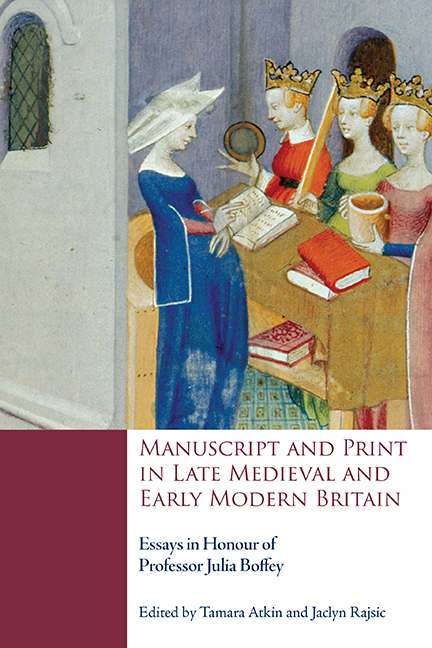 Manuscript and Print in Late Medieval and Early Modern Britain
Manuscript and Print in Late Medieval and Early Modern Britain Book contents
- Frontmatter
- Contents
- List of Illustrations
- List of Contributors
- Acknowledgements
- List of Abbreviations
- Introduction
- PRODUCING TEXTS
- 1 Gower's ‘Epistle to Archbishop Arundel’: The Evidence of Oxford, All Souls College, MS 98
- 2 From Oxford to Eton with Master John Maunshull: Teaching the Tria sunt in Bodleian Library MS Laud misc. 707
- 3 Gavin Douglas, Aesthetic Organization and Individual Distraction
- 4 Gavin Douglas's Eneados: The 1553 Edition and its Early Owners and Readers
- 5 Caxton and the Crown: The Evidence from the Exchequer of Receipt Reconsidered
- 6 Late Medieval Books of Hours and Their Early Tudor Readers In and Around London
- 7 London, British Library, MS Harley 367 and the Antiquarian Ideals of John Stow
- READING INFLUENCE
- Afterword
- Julia Boffey: A Bibliography
- Manuscript Index
- General Index
- Tabula Gratulatoria
4 - Gavin Douglas's Eneados: The 1553 Edition and its Early Owners and Readers
from PRODUCING TEXTS
Published online by Cambridge University Press: 06 September 2019
- Frontmatter
- Contents
- List of Illustrations
- List of Contributors
- Acknowledgements
- List of Abbreviations
- Introduction
- PRODUCING TEXTS
- 1 Gower's ‘Epistle to Archbishop Arundel’: The Evidence of Oxford, All Souls College, MS 98
- 2 From Oxford to Eton with Master John Maunshull: Teaching the Tria sunt in Bodleian Library MS Laud misc. 707
- 3 Gavin Douglas, Aesthetic Organization and Individual Distraction
- 4 Gavin Douglas's Eneados: The 1553 Edition and its Early Owners and Readers
- 5 Caxton and the Crown: The Evidence from the Exchequer of Receipt Reconsidered
- 6 Late Medieval Books of Hours and Their Early Tudor Readers In and Around London
- 7 London, British Library, MS Harley 367 and the Antiquarian Ideals of John Stow
- READING INFLUENCE
- Afterword
- Julia Boffey: A Bibliography
- Manuscript Index
- General Index
- Tabula Gratulatoria
Summary
THE ENEADOS IS GAVIN DOUGLAS's LONGEST and most impressive work. A translation of Virgil's Aeneid, together with the so-called ‘Thirteenth Book’ composed by the humanist Maffeo Vegio, it was completed in 1513, while Douglas was provost of St Giles in Edinburgh. Five good manuscripts of the work are extant, all written within forty years of its completion; the earliest and best of these, now owned by Trinity College, Cambridge (MS O.3.12), was written by Douglas's secretary, Matthew Geddes, and provides the basis for David Coldwell's edition for the Scottish Text Society. Scholarly study of the text of the Eneados has largely been confined to these manuscripts. But there also survives an edition of the poem, printed at London in 1553 and attributed to the press of William Copland (henceforth 1553), which until recently has received little attention from scholars and strikingly unfavourable assessments. According to Coldwell, it is ‘remarkable for its inaccuracies, its partial Anglicising of the spelling and its Protestantism’ (I, pp. 101–2). Nonetheless, despite its undoubted deficiencies, 1553 has great historical significance. It was published only a few years after the last manuscript of the Eneados was completed in November 1547, and it disseminated much wider awareness of the work in the second half of the sixteenth century. What is more, the influence of 1553 continued into later centuries, and may still be detected in subsequent editions of the Eneados, such as those of Thomas Ruddiman (1710) and John Small (1874). The present chapter begins with a brief account of the leading characteristics of 1553, but its chief aim is to provide new information about its circulation and readership.
Douglas was much better known during the sixteenth century than Dunbar or Henryson. There is ample evidence to confirm the truth of his prophecy that the Eneados would be widely read: ‘Throw owt the ile yclepit Albyon | Red sall I be, and sung with mony one’ (Conclusio, line 11). Various factors, apart from its poetic excellence, may have contributed to the success of the Eneados, such as Douglas's bishopric and his noble birth, as son of one earl of Angus and uncle to another.
- Type
- Chapter
- Information
- Manuscript and Print in Late Medieval and Early Modern BritainEssays in Honour of Professor Julia Boffey, pp. 73 - 88Publisher: Boydell & BrewerPrint publication year: 2019


